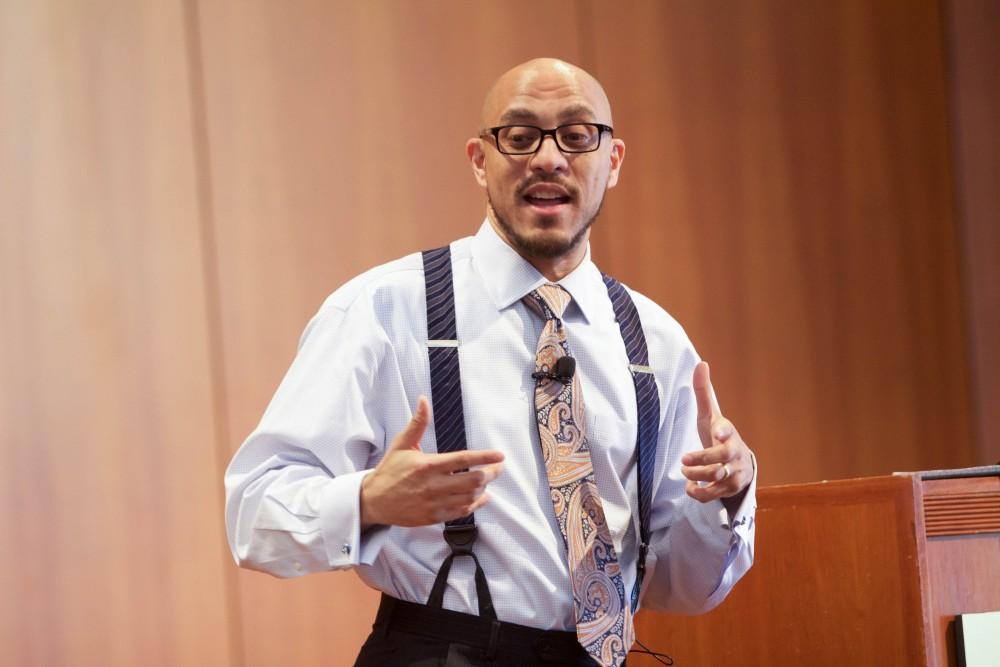‘Remaking history’

GVL/Mackenzie Bush – Hasan Kwame Jeffries, Associate Professor of History at Ohio State University, talks about the Civil Rights Movement in the age of Trump. The lecture was held Thursday, Feb. 2, 2017 in the Cook-Dewitt Auditorium.
Feb 6, 2017
As any president would, President Donald Trump delivered a statement about Black History Month Wednesday, Feb. 1. What made his speech stand out from past presidents’ was that he mentioned the famous abolitionist Frederick Douglass and said Douglass was “being recognized more and more,” making it seem as though Douglass were still alive.
The Ohio State University associate professor of history Hasan Kwame Jeffries used this recent news story to open up his discussion of civil rights movements of the past and present and to address concerns that might come with grassroots activism under Trump. His lecture, which he delivered Thursday, Feb. 2, in the Cook-DeWitt Center, was titled “Remaking History: The Civil Rights Movement and the Age of Trump.”
In his talk, Douglass coined the phrase “freedom rights,” which is a combination of civil rights and human rights (i.e., rights guaranteed by the federal government under the Constitution and rights all people have as human beings, respectively).
Jeffries said the way the Civil Rights Movement is talked about and taught does not reflect everything it represented. The goals of the movement have been narrowed in popular culture to things like federal legislation and the right to vote, he said, but there was a lot more to it than that.
“It’s too narrowly constructed,” Jeffries said. “If you too narrowly construct the goals that African-Americans are fighting for and disconnect it from the struggle of African-Americans fighting for freedom from the moment of emancipation, then you don’t realize that 100 years later and 150 years later, (African-Americans) are fighting for essentially the same thing.”
Jeffries used Martin Luther King Jr. as an example of how there is a disconnect between what happened during the Civil Rights Movement and how it is viewed now.
He said when King is talked about, he is the “isolated Dr. King,” not the “radical Dr. King” he really was.
When King gets brought up, it’s always him on the steps of the Lincoln Memorial talking about “color blindness,” Jeffries said, not the King who criticized the Vietnam War, criticized the system of American capitalism and believed in civil disobedience and protest.
Jeffries thinks this watering down of the issues obscures the Civil Rights Movement and omits many of the other working parts, such as the grassroots organizers, the other leaders and the millions of men and women involved in the movement as well.”
“So, when you have this King-centric movement in this remade understanding and framing of the Civil Rights Movement, then you completely overlook all the people who did not look like Martin Luther King who were critical to the Civil Rights Movement,” Jeffries said.
Jeffries also took a punch at the way the “bad guys” of the era are portrayed. It’s easy to put the blame on the Ku Klux Klan or Governor George Wallace because you can say the solution to making things right in the country was to get rid of them, Jeffries said, adding that the South was not the only problem.
Jeffries explained there was a racist attitude all over the country—there just weren’t laws in the North about segregation like there were in the South.
“The height of the modern Klan (was) 1945 to 1970,” Jeffries said. “The total number of black people that the Klan killed between 1945 and 1970 for the entire South in any year (was) significantly less than the number of black people killed by police in any major metropolitan area in one year during that entire period.”
Along with his critique of the way the Civil Rights Movement is currently represented, Jeffries offered his two cents on ways in which the country will be changing under Trump.
Jeffries said people have to stand up, fight back, mobilize and speak out when there are injustices being perpetrated, like the false claim that three million illegal immigrants voted in the election.
“If you understand the issue of voting, voting rights and disenfranchisement, you realize that the signals are already going up,” Jeffries said. “A voter fraud investigation, essentially that’s setting up voter suppression.”
The talk was well-met by the almost full house. Audience members enjoyed the jokes Jeffries sprinkled throughout and believed in his message.
“Remembering that all those struggles back then are still occurring today, we can’t forget the past hurt and the pain without letting it reflect on today and people in our society today,” said Kambriana Gates, a GVSU junior.
Jeffries hopes people walked away from the talk with a better understanding of what the Civil Rights Movement was and how it is still occurring today.
“The lessons of the African-American struggle for justice and equality are as pertinent now as they have ever been,” Jeffries said.

























